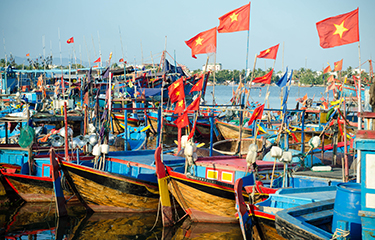Vietnam is making a big push to rid itself of the European Union’s yellow card, a trade warning first issued in October 2017 after the European Commission decided the Southeast Asian nation had not done enough to counter illegal, unreported, and unregulated fishing.
The E.U. is now in the process of conducting a review of Vietnam’s fisheries-related policies to determine whether to rescind the yellow card and resume normal trading relations, to maintain the country’s yellow card status, or to issue a red card banning all seafood imports from Vietnam to the E.U.
E.C. inspectors visited Vietnam in October 2022, and E.C. Directorate-General for Maritime Affairs and Fisheries (MARE) IUU Fisheries Policy Unit Head Roberto Cesari said his team will be returning within six months for a follow-up appointment. After the E.C. assessment report is released, Vietnam will have six months to adopt the recommendations in the report, according to Vietnam’s General Department of Fisheries.
In previous reviews, the E.C. has acknowledged significant advancements made by Vietnamese authorities to clamp down on IUU fishing. However, it pointed out deficiencies in Vietnam’s fishing-vessel registration system, fishing license controls, and vessel-monitoring system implementation.
The E.C. said Vietnam must implement an effective identification mechanism for imported wild-caught seafood coming into the country via container ships, alleging its current lack of effective import controls is contributing to the possibility that domestic and foreign raw materials are mixed before being processed and exported to the E.U.
Vietnam has not been able to curtail illegal fishing incursions committed by Vietnamese fishermen into the exclusive economic zones of neighboring countries. In 2022, 104 Vietnamese fishing vessels and 919 fishermen were detained for presumed illegal fishing abroad. Those violations will harm Vietnam’s efforts at having its yellow card removed, according to Vietnam’s Agriculture Ministry, and run counter to comments made in September 2021 by Vietnam Prime Minister Pham Minh Chinh ordering an end to Vietnam’s participation in IUU fishing.
At a 1 December meeting on IUU fishing with leaders of coastal provinces, ministries, and government agencies, Chinh renewed his call for the country to end all involvement in IUU fishing. He issued a formal request the agriculture ministry develop an action plan within 180 days clearly define the responsibilities of the central government, ministries, government agencies, provinces, cities, districts, communes, and the seafood and fishing industries in eliminating IUU fishing. Following up on Chinh’s comments, Vietnam Agriculture Vice Ministry Phung Duc Tien said at the meeting the action plan prepared by his ministry will focus on the coordination between different forces such as customs, coast guard, border protection, with the goal of ending any association between Vietnam and illegal fishing by 31 March, 2023. Tien said the agriculture ministry is assembling interdisciplinary working groups to supervise the implementation of the plan nationwide, and said local governments hold responsibility for monitoring the activities of fishing vessels from their regions, and will be held responsible if any fishing vessel from their locality is found violating other countries’ water, Tien said.
Separately, Chinh is making a diplomatic push to get the yellow card removed. During a European trip between 9 and 15 December, 2022, to attend the ASEAN-E.U. summit and visit Luxembourg, the Netherlands, and Belgium, Chinh repeatedly asked European officials for their support in removing the yellow card, according to a statement from the Vietnamese government.
The red card imposed by the E.C. would cause severe losses to Vietnam’s seafood exports, according to a 2021 report from VASEP and the World Bank. Their report, “A Trade-Based Analysis of the Economic Impact of Non-Compliance with Illegal, Unreported and Unregulated Fishing: The Case of Vietnam,” estimated Vietnam will lose USD 387 million (EUR 364.8 million) per year from the loss of export revenue from wild-caught seafood including tuna, squid, and octopus, and USD 93 million (EUR 87.7 million) annually from a loss of income from farmed seafood exports, which would be indirectly affected by the E.C.’s ban. Vietnam’s wild-caught seafood output is likely to decrease by about 30 percent within two to three years of a red card being implemented, the report found.
Besides Europe, Vietnam is being forced to respond to a request from Japan, which is Vietnam’s top seafood market, to have Vietnamese companies begin providing catch certificates for four marine species beginning 1 December, 2022. According to the Vietnam Association of Seafood Exporters and Producers (VASEP), these include squid and cuttlefish, Pacific saury, mackerel, and sardine, which are considered as high risk as originating from IUU fishing.
Photo courtesy of Korbut Ivetta/Shutterstock







